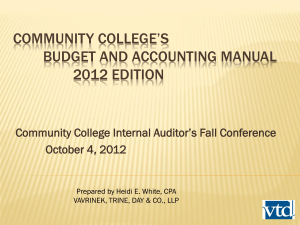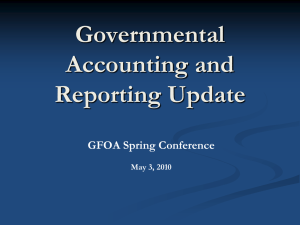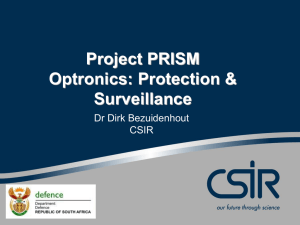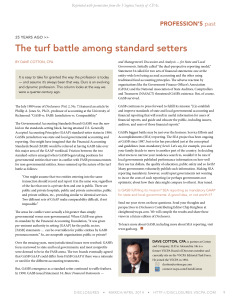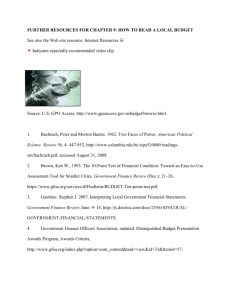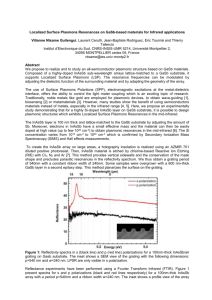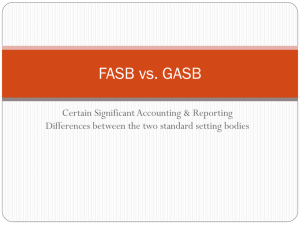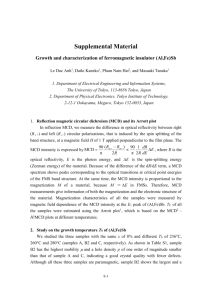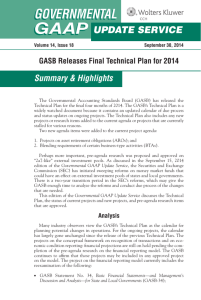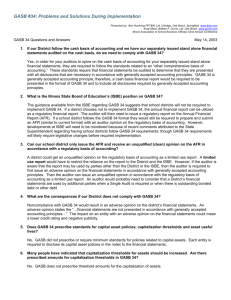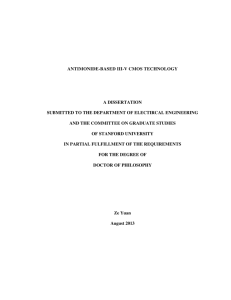What You Should Know about Standards Setting
advertisement
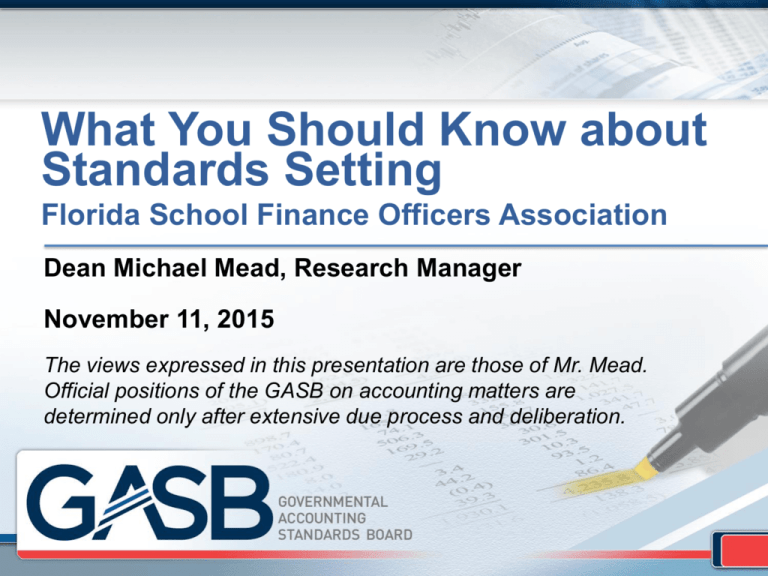
What You Should Know about Standards Setting Florida School Finance Officers Association Dean Michael Mead, Research Manager November 11, 2015 The views expressed in this presentation are those of Mr. Mead. Official positions of the GASB on accounting matters are determined only after extensive due process and deliberation. Overview What is the Governmental Accounting Standards Board (GASB)? How is the GASB organized? How are accounting and financial reporting standards set? What roles can school finance officers play in standards setting? What resources are available from the GASB for school finance officers? Q&A throughout 2 What Is the GASB? 3 The GASB’s Mission Establish and improve financial accounting and reporting standards to provide useful information to investors and other users of financial reports and educate stakeholders on how to most effectively understand and implement those standards The GASB is recognized by the AICPA as the setter of generally accepted accounting principles (GAAP) for state and local governmental entities 4 GASB was created in 1984 by agreement between the Financial Accounting Foundation and: • American Institute of CPAs • Council of State Governments • Government Finance Officers Association • International City/County Management Association • National Association of Counties • National Association of State Auditors, Comptrollers and Treasurers • National Conference of State Legislatures • National League of Cities • National Governors’ Association • U.S. Conference of Mayors 5 Why Have Separate Standards for State and Local Governments? Governments operate differently from other entities and in a very different regulatory environment Governments raise revenues very differently and primarily engage in nonexchange transactions The centrality of the adopted budget as a legally binding document The need for accountability to taxpayers and constituents The stakeholders are very different from those of other types of entities From the GASB White Paper (available at www.gasb.org under the “Reference Library” tab) 6 Why Report at All? Accountability, first and foremost Bond holders, taxpayer associations, grantors, legislators, and others need information about: - Financial position and economic condition, and how they have changed - Where money comes from and how it is spent - Whether current-year revenues were sufficient to cover current-year costs - Service efforts and accomplishments - Physical and other nonfinancial resources - Compliance with finance-related legal and contractual requirements [GASB Concepts Statement 1] 7 Who Follows GASB Standards? 37 states require at least some of their political subdivisions to follow GASB standards - 34 states require some or all school districts 29 states require some or all school counties 28 states require some or all cities, towns, and other localities Not sure about requirements for special districts Approximately 50,500 governments have outstanding municipal debt and the market prefers GAAP reporting Enforcement activities are performed by some states, but most enforcement comes down to the audit - Some governments hire a CPA firm - Others are audited by the state auditor or another auditor in government 8 How Is the GASB Organized? 9 The GASB The GASB is a private, not-for-profit organization located in Norwalk, CT Overseen by the Financial Accounting Foundation, along with: - Financial Accounting Standards Board - Financial Accounting Standards Advisory Council - Governmental Accounting Standards Advisory Council 10 The Board Full-time chairman and six part-time members - Chair: Dave Vaudt, former Iowa state auditor - Vice-chair: Jan Sylvis, former Tennessee chief of accounts - Jim Brown, retired partner, BKD LLP - Brian Caputo, CFO & treasurer, City of Aurora, IL - Bill Fish, former chief investment officer, Chartis U.S. - Michael Granof, distinguished professor, University of Texas - David Sundstrom, auditor-controller/treasurer-tax collector, Sonoma County, CA 11 The GASB Staff Research and technical activities staff (22) - Director of research and technical activities Senior technical advisor Research manager Project managers (9) Assistant project manager Practice fellows (2) Postgraduate technical assistants (7) Administrative staff (4) 12 How Are Standards Set? 13 Open Due Process Standards are set in full daylight with as much public input as possible Extensive research with stakeholders Open Board meetings (can be viewed live online or recorded in archive): - Three-day meetings in Norwalk every six weeks - Teleconference meeting in between each Norwalk meeting Public exposure of proposals for stakeholder comment, usually more than one round for major topics - For major topics, will conduct public hearings and user forums - Conduct field test of proposed standards with actual governments, including school districts 14 Constant Stakeholder Feedback Interviews, roundtables, surveys, and other research that involves actual stakeholders Governmental Accounting Standards Advisory Council (GASAC) - 31 members, including Association of School Business Officials International - Meets three times a year Task forces for major topics, composed of stakeholders broadly representative of the community of preparers, auditors, and users of financial statements Communication throughout the project One or more rounds of public comment on proposals 15 Where Do the Topics Come From? Stakeholder requests Issues identified by stakeholders and GASB during other projects GASB members and staff 16 How Are Topics Selected? Initial investigation • How significant is the topic? What does it entail? Input on priorities • GASAC annually reviews priority of potential topics • Feedback from other stakeholders Board consideration & more GASAC feedback 17 Pre-Agenda Research Literature review Roundtables Interviews Financial reports Surveys 18 From Research to Deliberations Stakeholder feedback • Input from the GASAC on the research results and priority of the topic Board consideration & decision Stakeholder feedback throughout • Task force (if one is appointed) and GASAC 19 Due Process Documents Major projects will issue a Preliminary Views for public comment, before developing and issuing a proposed Statement in an Exposure Draft Other projects directly issue an Exposure Draft Due process documents are generally exposed for 90 days Due process documents for major projects typically are accompanied by public hearings, and sometimes user forums and webinars Field tests are conducted with financial statement preparers to assess the effort and cost associated with implementation and to identify provisions that are not sufficiently clear 20 Setting Standards Is Just One Part of the Job Publishing implementation guidance in stand-alone guides to specific Statements and the annually updated Comprehensive Implementation Guide Answering technical inquiries from stakeholders - Form on website for submitting questions Writing articles for GASB and stakeholder publications Making presentations at conferences and seminars 21 How to Get Involved 22 Roles for School Finance Officers Let the GASB know about developing issues Sign up on the website visitor’s register Volunteer for task forces and other consultative groups Participate in research and other surveys when invitations are sent out Respond to due process documents Contact the GASB when you have implementation questions 23 Resources for Finance Officers 24 GASB Resources for Your Use All original GASB Statements, Concepts Statements, Interpretations, Technical Bulletins, and Implementation Guides are available free on the website Basic view of the Governmental Accounting Research System (GARS) is available free on the website Website pages devoted to each GASB project Online form for submitting questions about existing standards 25
